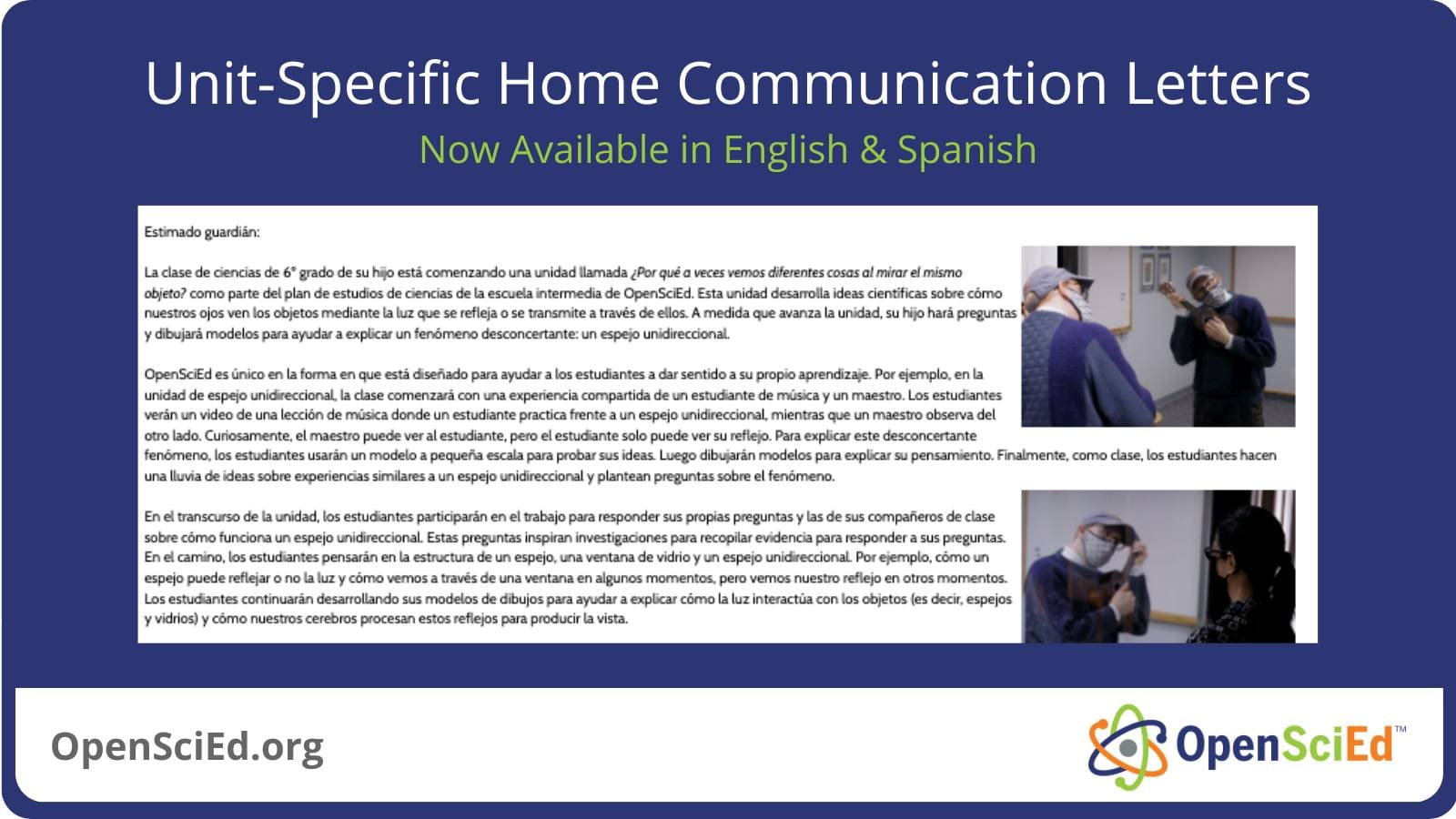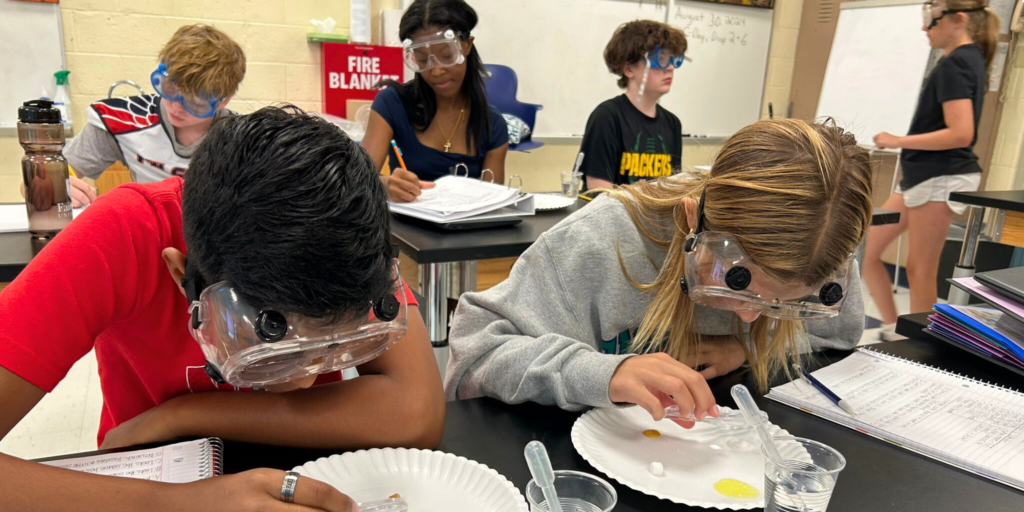Activating OpenSciEd at Home: Resources and Tips for Parent Engagement in Science Education
Activating OpenSciEd at Home: Resources and Tips for Parent Engagement in Science Education

Educators, share these resources to support parent engagement in science with your students’ families to support science learning at home and strengthen the bridge between home and school!
Empowering Parents and Caregivers, Empowers Students
Parent participation in children's science education is well-documented to yield positive outcomes. Research confirms that when parents actively explore concepts and the learning process, their children achieve greater success. This parent engagement leads to better academic performance, increased motivation to learn science, and the development of students' critical thinking skills. The more intensely parents can be involved, the more benefits are seen across skills, confidence, and science understanding measures.
However, parents and teachers often face obstacles that interrupt effective science learning partnerships, particularly for families from diverse and multilingual or immigrant backgrounds. Teachers have limited bandwidth for guiding investigations outside school walls. Parents may not feel confident with their own scientific background knowledge or have past negative perceptions about the subject. And the gap between family culture and classroom context poses additional barriers.
OpenSciEd’s science curriculum for middle school and high school students aims to bridge this gap through accessible and inclusive resources that empower families to actively participate in their students' science education at home. This post will explore OpenSciEd's unique approach to facilitating parent/teacher partnerships and provide helpful resources for family and parent engagement.
The Value of Parent Engagement in Science Education
The benefits of parents actively participating in their children's science education are multifaceted and significant. Studies have consistently shown that students display better academic achievement, motivation to learn about scientific concepts, and development of critical thinking skills when their families engage in the learning process.
Specifically, research by The University of British Columbia (Parental Engagement in Children's STEM Education) has found that students achieve higher grades in science courses when parents collaborate on investigating questions, discussing media and current science-related events, and facilitating hands-on learning activities at home. The experience of exploring phenomena collaboratively strengthens communication and relationships that provide lasting impacts on student outcomes.
Additionally, students demonstrate increased interest in science and self-perception when parents display enthusiasm and value for understanding the world around them. Facilitating regular family science experiments, asking open-ended questions about observable events, and role-modeling an inquisitive mindset are key parent actions that stimulate stronger intrinsic motivation in students.
Finally, when parents bridge the gap between formal classroom and informal home learning, children's higher-order thinking abilities flourish. Science exploration builds critical analysis, evidence evaluation, and problem-solving skills that transfer across academic subjects.
OpenSciEd: Bridging Classroom Learning and Home Engagement
Beyond excelling as an NGSS-aligned science curriculum, OpenSciEd serves a holistic purpose - bringing parents on board as partners in education. This theme of inclusive family involvement sits at the core of the program's mission to democratize access to quality STEM opportunities.
Because research shows active parent participation propels student motivation to explore, comprehend, and apply scientific concepts, OpenSciEd bakes multiple avenues facilitating at-home learning into its educational DNA. Customizable Home Letters outline unit objectives for families, while translated curricula tear down potential language barriers. Public lesson material samples also provide tips to guide families new to inquiry methods.
These layers of transparency allow parents to meaningfully supplement classroom work tailored to their capability, time, and cultural preferences. When implemented with fidelity, OpenSciEd provides keys to unlocking the advantages of tight school-home alignment. Students thrive when living room discovery mirrors school instruction rather than seeming disconnected.
Additionally, by engaging parents in hands-on science activities, OpenSciEd strengthens family bonds that facilitate students' social-emotional development. Collaborative exploration builds confidence and communication abilities, which are key to academic and lifelong success.
Addressing Challenges for Multilingual Families

Parents in multilingual or immigrant families often face unique hurdles supporting STEM education due to language gaps or unfamiliarity navigating school systems. Research by Carnegie Corporation of New York profiled several immigrant families and identified their challenges and needs for engaging them in their children’s STEM education. For those families not proficient in the instructional language, grasping complex concepts and effectively communicating with school administrators and teachers can prove challenging. Additionally, accessing resources and understanding academic expectations presents a steep learning curve.
Fortunately, OpenSciEd’s customizable multilingual letters and materials bridge these divides, empowering English language learners and immigrant families to actively participate in their children’s science learning journey regardless of background. Translated unit overviews provide insights into classroom topics, while editable Home Communication letters enable personalized sharing of learning objectives.
Additionally, OpenSciEd’s accommodating design supports diverse needs, creating welcoming environments for multilingual students to grow academic passion and brilliance for science. By proactively implementing these inclusive resources, schools can address systemic inequities and foster enriching educational experiences benefitting all families.
OpenSciEd’s ethos understands that helping all parents become allies in the learning journey takes proactive partnership, not happenstance.
Resources for Teachers to Share with Parents

Facilitating two-way partnerships between classrooms and living rooms remains imperative for nurturing students’ science engagement. Recognizing this need for collaboration, OpenSciEd offers customizable materials promoting accessible channels for all families to actively assist their children’s learning.
- Sample Introduction Letter: OpenSciEd offers a customizable letter to help teachers introduce parents to OpenSciEd, explaining that they have adopted the OpenSciEd curriculum. It provides a high-level overview of OpenSciEd’s NGSS-aligned, student-driven approach to deep science learning centered around exploring real-world phenomena. It’s intended to be edited by the district or the teacher. [view]
- Editable “Home Communication” Letters: To extend learning into family contexts further, OpenSciEd provides editable Home Communication letters (also available in Spanish) in every unit that outline what the students will be figuring out in that unit and help teachers highlight student activities, questions, and interests for tailored parental support. This flexibility bridges schoolwork relevancy gaps. [view]
- Overview Videos on OpenSciEd’s YouTube Channel: Short videos on OpenSciEd’s public YouTube channel also showcase curriculum components from the parent’s perspective using straightforward language and real classroom footage. These dynamic samples demystify abstract concepts and prime intergenerational discussions. [view]
- The Activate Learning Digital Platform: The Activate Learning Digital Platform is where teachers and students access the complete interactive digital edition of OpenSciEd materials. In addition to materials and assessments, it has over 130 languages available, which makes it easier for parents of a second language to engage with their children on reading, projects, models, and assessments. This is a powerful resource for engaging families from immigrant backgrounds. [view]
- NGSS Parental Resources: Teachers can pair OpenSciEd’s offerings with NGSS K-12 supplemental parent guides, elucidating the research-based frameworks that cultivate skills like critical thinking. Comprehensive resources illuminate why contemporary science education emphasizes certain practices. [view]
- NSTA Parental Resources: The National Science Teaching Association (NSTA) offers a wealth of information and strategies to support parental involvement in science education. Their Position Statement outlines numerous ways parents can nurture curiosity in children of all ages. They also offer tips for busy parents on engaging students in science at home, including visiting museums, discussing science in the news, and encouraging girls and boys to explore their curiosity equally. [view]
The Collective Effort Toward Science Literacy
By combining the resources and strategies from OpenSciEd, NGSS, and NSTA, teachers can offer a comprehensive support system to parents, empowering them to play an active and informed role in their children's science education. This collaborative approach can significantly enhance students' learning experiences and foster a lifelong interest in STEM fields.
OpenSciEd uniquely furnishes science teachers with the tools to transform passive parent involvement into active family participation, accelerating student outcomes. Customizable home letters, available in multiple languages, effectively communicate classroom objectives while standards-aligned lesson samples model inquiry activities extending learning beyond school walls.
Empower families in your district to become partners in OpenSciEd's vision for inclusive science education. Leverage this suite of informational materials, overview samples, and detailed translations to erase engagement barriers facing underserved families.
With this support, every student’s home can become a hands-on science learning environment!
* * * * * *



